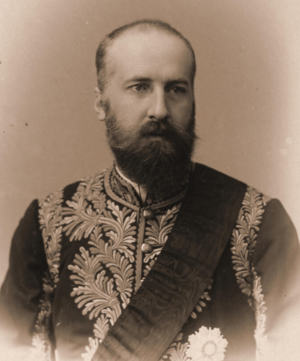Franz I, Prince of Liechtenstein facts for kids
Quick facts for kids Franz I |
|||||
|---|---|---|---|---|---|

Franz as ambassador to Russia from Austria
|
|||||
| Prince of Liechtenstein | |||||
| Reign | 11 February 1929 – 25 July 1938 | ||||
| Predecessor | Johann II | ||||
| Successor | Franz Josef II | ||||
| Born | 28 August 1853 Liechtenstein Castle, Austrian Empire |
||||
| Died | 25 July 1938 (aged 84) Feldberg, Czechoslovakia |
||||
| Burial | Church of the Nativity of the Virgin Mary, Brno, Czechoslovakia | ||||
| Spouse | Elisabeth von Gutmann | ||||
|
|||||
| House | Liechtenstein | ||||
| Father | Aloys II | ||||
| Mother | Franziska Kinsky | ||||
| Signature | |||||
Franz I (full name: Franz de Paula Maria Karl August) was the Prince of Liechtenstein from 1929 until he passed away in 1938. He was born on August 28, 1853, and became prince on February 11, 1929. His time as prince saw important changes in Europe, especially with the rise of new political powers.
Contents
Early Life and Education
Franz de Paula Maria Karl August was born on August 28, 1853. His parents were Prince Aloys II and Countess Franziska Kinsky. He was born at Liechtenstein Castle.
He studied at the University of Vienna and the University of Prague. After his studies, he worked as an Austro-Hungarian ambassador to the Russian Empire. He held this important diplomatic role from 1894 to 1898. He was also honored as the 1,204th Knight of the Order of the Golden Fleece in Austria.
Franz fell in love with Elisabeth von Gutmann. She was a widow who had converted to Roman Catholicism in 1899. His brother, Johann, did not approve of their relationship. Despite this, Franz secretly married Elisabeth in Salzberg in 1919. They married again publicly after Johann's death in 1929.
Becoming Prince of Liechtenstein
On February 11, 1929, Johann II passed away. This meant that Franz became the new Prince of Liechtenstein. Just a few weeks after he became prince, a large amount of land belonging to the Liechtenstein family was taken by Czechoslovakia. This land was about 395,360 acres.
Some farmers in Liechtenstein asked him to create a republic, which is a country ruled by elected officials instead of a prince. However, Franz said he would not give any of his personal money to the country. This meant Liechtenstein would have to rely only on taxes. Because of this, the farmers stopped trying to create a republic.
Key Events During His Reign
In 1937, the Prime Minister of Liechtenstein, Josef Hoop, shared some interesting news. He said that Otto von Habsburg, who was a claimant to the Austrian throne, was staying at Liechtenstein Castle. Otto was a guest of Prince Franz I. He chose to live there to be closer to Austria, instead of his previous home in Belgium.
During Franz I's rule, an agreement was also signed between Liechtenstein and the United States. This agreement was about sending people back to their home countries if they were wanted for crimes.
Franz I did not have any children of his own. This meant his nephew, Prince Aloys, was next in line to become prince. However, in 1923, Aloys decided to step aside. He wanted his son, Franz Joseph, to be the next in line instead.
Later Years and Succession
On March 31, 1938, Franz I made his grandnephew, Franz Joseph, the regent. A regent is someone who rules a country when the main ruler is unable to. This happened after Austria was joined with Nazi Germany in an event called the Anschluss.
After making Franz Joseph regent, Franz I moved to Feldberg, which was in Czechoslovakia. He passed away on July 25, 1938, at one of his family's castles, Castle Feldberg. After his death, Franz Joseph officially became the Prince of Liechtenstein.
Even though Franz I said he made Franz Joseph regent because of his old age, some people thought there was another reason. It was believed that he did not want to be in charge of Liechtenstein if Nazi Germany decided to invade the country.
Honors and Awards
Franz I received many special awards and honors during his life:
 Liechtenstein: He founded the Order of Merit of the Principality of Liechtenstein in 1937. This was on the anniversary of his marriage.
Liechtenstein: He founded the Order of Merit of the Principality of Liechtenstein in 1937. This was on the anniversary of his marriage. Austria-Hungary:
Austria-Hungary:
- He received the Grand Cross of the Imperial Order of Leopold in 1897.
- He became a Knight of the Golden Fleece in 1917.
 Sovereign Military Order of Malta: He was given the Bailiff Grand Cross of Honour and Devotion.
Sovereign Military Order of Malta: He was given the Bailiff Grand Cross of Honour and Devotion. Russian Empire:
Russian Empire:
- He was a Knight of St. Alexander Nevsky.
- He became a Knight of St. Andrew in 1906.
 Kingdom of Bavaria: He was a Knight of St. Hubert in 1909.
Kingdom of Bavaria: He was a Knight of St. Hubert in 1909.
See also
 In Spanish: Francisco I de Liechtenstein para niños
In Spanish: Francisco I de Liechtenstein para niños
 | Percy Lavon Julian |
 | Katherine Johnson |
 | George Washington Carver |
 | Annie Easley |

